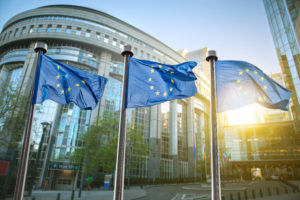Highlights from the Past Weeks
CW 13 / Monday, 27 to Thursday, 30 March: Mini-Plenary Session Week (Brussels);
CSAM I – NEW COMPROMISE PROPOSAL IN THE COUNCIL: Last week, a new proposal (PDF) from the Swedish Presidency on the Regulation to prevent online child sexual abuse material was discussed in the Working Party on Law Enforcement.
The new compromise text contains some format changes (e.g. a new Article 13a on notification of emergencies, which has been separated from Article 13, and a new Article 38a on mutual assistance between coordinating authorities, which is modelled on the DSA).
It also contains additional safeguards (e.g. the addition in Art. 1(3) that the Regulation shall apply “without prejudice to fundamental principles relating to the right for respect to private life and family life and to freedom of expression and information”). Further, deletion orders should now be executed within 24 hours (instead of one hour) and blocking orders under Article 16 should be “targeted”. In addition, classic telephone services are to be excluded from the scope of the Regulation.
In Articles 88 and 89, interesting questions are raised by the Swedish Presidency, such as whether the temporary derogation should be extended or used to make voluntary disclosure a permanent situation. Also, the question of how long the period between the publication of the Regulation in the Official Journal and the entry into force of the rules should be, with the Presidency stating that it would be “at least 12 months”.
CSAM II – BUDGET COMMITTEE PUBLISHES AMENDMENTS: The Budget Committee (BUDG) published its amendments (PDF) to the CSAM proposal last week.
- Geese (Greens, DE) introduced the idea of a “Survivors’ Advisory Board” which would be part of the EU Centre and serve as an expert panel for several parts of the proposal (see AM 89).
- Geese (Greens, DE) and S. Modig (The Left, FI) introduced minor changes to the appointment process of the Executive Director and the Technology Committee.
- Negrescu (S&D, RO) introduced a number of amendments that fall outside the scope of the BUDG, but stressed the need for the EU Centre to participate in awareness-raising campaigns.
ENCRYPTION – USA AND EU WANT EASIER ACCESS: The European Union and the United States want to win public support for giving law enforcement agencies easier access to encrypted communications. This is according to a document summarising a high-level meeting between officials seen by Politico.
High-level officials from the US and the EU recently agreed to step up their efforts to convince citizens of the need for law enforcement agencies to have access to highly-secured personal communications to fight crime. The plan was discussed at a meeting in Stockholm on 16 and 17 March, according to a document dated 24 March.
“The EU’s conviction of the need to reinforce (also in public discourse) law enforcement’s legitimacy to investigate was echoed by the U.S. delegation, which concurred on the need to mirror privacy by design with lawful access by design,” reads a summary of the meeting drafted by the EU Council General Secretariat and circulated to EU national delegations (see Politico Pro, paywall).
CYBER RESILIENCE – DRAFT REPORT OF THE ITRE COMMITTEE: European Parliament rapporteur N. Danti (Renew, IT) has finalised his draft report (PDF) on the Cyber Resilience Act (CRA).
This includes an expert group on cyber resilience, delays in cybersecurity certification systems, details on the EU vulnerability database or the determination of fines for the Digital Europe programme (see Politico Pro, paywall)
ARTIFICIAL INTELLIGENCE – NEW TIMETABLE IN PARLIAMENT: According to the revised timetable (PDF) of the two lead committees (LIBE and IMCO), MEPs are expected, probably on 26 April 2023, to vote on the joint draft report by rapporteurs B. Benifei (S&D, IT) and D. Tudorache (Renew, RO) and the amendments tabled to it.
Once adopted, the committees would then submit the text to the plenary for adoption as the European Parliament’s negotiating position for the trilogue negotiations with the Council. However, the date for the plenary vote has not yet been set.
All compromise amendments (PDF) discussed by MEPs during the shadow rapporteurs’ meeting last week were adopted. Most importantly, parliamentarians adopted a definition of AI that corresponds to that of the OECD.
The next technical meeting is scheduled for 11 April and the next political trilogue for 13 April (see Politico Pro, paywall or Politico Pro, paywall).
EMFA – LEGAL BASIS OF THE MEDIA FREEDOM ACT CONFIRMED: In an opinion presented on Tuesday, the Legal Service of the EU Council stated that the legal basis for the single market was the appropriate legal instrument for the new media law, which caused some controversy as this issue traditionally falls under national competence.
The proposal aims, in particular, at strengthening transparency of media ownership and editorial independence. Some publishers have been vocal in their opposition to the proposal, especially in Germany, where media policy is dealt with at the state level.
The European Parliament’s Culture Committee’s draft report on the regulation is due next month so that it can be voted on by the end of June, said rapporteur S. Verheyen (EPP, DE) (see Euractiv).
In Germany, the responsibility for the media lies with the federal states and the EMFA is a thorn in their side. The German state governments have no intention of giving up: In a new decision adopted on Friday, the German Federal Council (Bundesrat) stated in its resolution (PDF) that it will reject a “general approach” on the EMFA text “as long as and to the extent that this fundamental design flaw in the Council’s proposals, which disregards the competences of the Member States, persists,” (see Politico Pro, paywall).
INFRASTRUCTURE – GIGABIT INFRASTRUCTURE LAW PRESENTED IN EP: DG CONNECT Deputy Director General Renate Nikolay on Tuesday presented the Commission’s proposal to accelerate 5G and fibre optic roll-out – the Gigabit Infrastructure Act (GIA) – to the Industry Committee (ITRE), which will be responsible for the dossier.
As a regulation and because it is intended to replace the BCRD Directive, the GIA will “significantly reduce the fragmentation of the single market, but it remains an instrument of minimum harmonisation”, with exceptions for Member States depending on their “specific circumstances”, Nikolay said (video, 16h21).
According to initial reports, the rapporteur will come from the ranks of Liberal Renew.
PRIVACY – COOKIES IN TARGET FOR NEW LEGISLATURE: Justice Commissioner D. Reynders is considering possible regulatory measures for the next mandate to tackle “cookie fatigue”. During a briefing with journalists on 28 March, Reynders said he wanted to bring the major platforms and websites to the table to discuss the extent to which they can commit to tackling “cookie fatigue” as part of a voluntary commitment that “hopefully” can be completed before spring 2024. The goal, he said, is to find a technical solution to centralise users’ consent to their data in one place instead of asking for it via complex pop-ups.
While the European Data Protection Authority (EDPA) and several authorities have strengthened their measures on cookies, Reynders wants the Commission to keep a close eye on this initiative to see if further rules are needed. “If in the end a new legislative initiative is needed, that is up to the Commission and not the regulators,” he said (see Politico Pro, paywall).
DIGITAL SERVICES ACT – HEARING IN EP WITH TIMETABLE: Technology companies that have declared themselves as very large online platforms and search engines under the Digital Services Act are working “constructively” with the European Commission, the head of the relevant department in DG Connect, Prabhat Agarwal, said last week during a hearing in the European Parliament. (Video, 15h32)
“This is the first indication that the Digital Services Act is being taken seriously by relevant stakeholders,” Agarwal said. The Commission is expected to name around 20 major platforms that fall under its supervision in the next two weeks.
Agarwal also gave an update on the timetable for the DSA:
- Calculation of the annual supervision fee adopted on 2 March and reviewed by 3 June.
- Procedure for very large online platforms and search engines: Adoption scheduled for end of May.
- Independent audits: Public feedback will “most likely” open in May, adoption for end of June.
- The transparency reporting obligation could be introduced towards the end of the year with some additional rules.
- Data access for researchers requires the existence of the panel of national coordinators for digital services, which is scheduled for February 2023; adoption is expected in March 2024.
The IMCO Committee received feedback from C. Schaldemose (S&D, DK) on the activities of the DSA Implementation Working Group. The group, whose first meeting was held last week, is still waiting for the Commission to designate the VLOPs. DSA rapporteur Schaldemose emphasised the positive dialogue between the platforms and the EU executive. The next meeting of the group is planned for July or September (video, 15h13).
AUDIOVISUAL MEDIA – CULTURE COMMITTEE URGES FASTER HARMONISATION: On Tuesday, the Committee on Culture and Education adopted a draft implementation report on the 2018 revision of the Audiovisual Media Services Directive.
Audiovisual media services in the EU are still regulated at a “different strength”, leading to an uneven playing field, said the Committee, which also calls for more efforts in consumer protection and the protection of minors across all media types or playback channels. MEPs criticise the “insufficient will” of some Member States to implement the directive and the “overall reluctance” of the Commission to initiate infringement proceedings.
The text is expected to be voted on during the plenary week from 8 to 11 May (EP press release).
DATA ACT – TRILOGUE NEGOTIATIONS OFFICIALLY STARTED: Last week, the trilogue negotiations on the Data Act were officially started (see tweet by the Swedish Presidency and MEP Pilar de Castillo on LinkedIn). Further dates for the political trilogue are scheduled for 23 May and 28 June. Until then, nine technical meetings are expected to take the work forward (Euractiv).
The first 4-column document (PDF) has been published by Contexte (paywall, FR).
ENERGY I – COUNCIL AND PARLIAMENT CONCLUDE NEGOTIATIONS ON RED III: The European Parliament and the Council reached a preliminary agreement in the trilogue negotiations last week on the targeted proposal to amend the Renewable Energy Directive presented by the Commission in the framework of its REPowerEU plan.
The goal is to increase the share of renewable energy in total EU energy consumption to 42.5% by 2030, potentially to 45%. Each Member State will contribute to this common goal. The text of the agreement is not yet available and has yet to be officially confirmed by both sides (see EP press release and Council press release).
ENERGY II – DETAILS OF THE ENERGY EFFICIENCY ORDINANCE: At the recent Industry Committee meeting, rapporteur Niels Fuglsang (S&D, DK) informed MEPs about the results of the fifth and final trilogue on the proposal to revise the Energy Efficiency Directive, which took place on 9 March. (Video, 10h28)
The rapporteur noted that the last round of trilogue negotiations allowed the co-legislators to find compromises on the main issues of the proposal, namely: (i) the energy efficiency targets, (ii) the energy savings obligation and (iii) the role of the public sector in energy efficiency.
The vote in committee is expected to take place before the end of April, with strong support from the EPP, S&D, Renew and Greens.
GERMANY – ECONOMICS MINISTRY WANTS TO ENSURE PARTICIPATION IN DMA: In its six priorities (PDF) published on 16 March, the German Federal Ministry for Economic Affairs and Climate Action (BMWK) wants the Digital Markets Act to focus on Amazon, Apple, Google, Meta and Microsoft, but also to include other players, including Booking and Twitter, in time. The Ministry also demands tangible results for users and SMEs: Combating discriminatory terms of use of access controllers, strengthening the choices of Internet users and limiting the data combinations of these gatekeepers. The BMWK also calls for ensuring the participation of states and competition authorities. Germany promises to implement its “German DMA” (Article 19a of the Act against Restraints of Competition) in “close cooperation and coordination with the European Commission”. The compatibility of the two regulations remains an open question (see press release BMWK, DE).
Relevant Publications, including from the EP Think Tank:
- Outcome of the meetings of EU leaders of 23-24 March 2023 (Briefing)
- General Product Safety Regulation (At a Glance)
- Renewable energy in the EU (At a Glance)
- General-purpose artificial intelligence (At a Glance)
- Plenary round-up – December 2023 (At a Glance)
Selected consultations of the EU Commission
- Net Zero Industry Act – feedback on the regulation: 20 March to 22 May 2023
- European Critical Raw Materials Act – Feedback on the Regulation: 20 March to 22 May 2023
- High-speed broadband services in the EU – Review of the rules – Feedback on the regulation: 27 February – 16 May 2023
- The future of the electronic communications sector and its infrastructure – Consultation: 23 February – 19 May 2023
- New product priorities in Ecodesign for Sustainable Products – Call for Evidence: 31 January to 12 May 2023
- VAT in the digital age – feedback on the directive: 8 December 2022 to 4 April 2023
Outlook for the Current Week
You can find a list of the upcoming dates of the European Parliament here. The meeting calendar for 2023 is available here (PDF).
You can find an overview of the most important dates of the week of the Council here or the meeting calendar here.
The official calendar, as well as the programme of the Swedish Presidency, can be found on the corresponding website.
Council appointments include:
Summits and Ministerial Meetings:
- none
Preparatory Bodies:
- Working Party on Hybrid Threats, Monday, 3 April 2023, 15.00
- Working Party on Tax Questions – Direct Taxation, Monday, 3 Apriul (Agenda);
- Working Party on Competitiveness and Growth (Internal Market) (including Ecodesign, SMEI), Monday, 3 April (Agenda), Tuesday, 4 April (Agenda);
- Working Party on Consumer Protection and Information, Monday, 3 April (Agenda) and Tuesday, 4 April (Agenda);
- Working Party on Cooperation in Criminal Matters (COPEN), Monday, 3 April (Agenda), Tuesday, 4 and Wednesday, 5 April (Agenda);
- Coreper I (i.a. Chips Act, RED), Wednesday, 5 April (Agenda);
- Coreper II, Wednesday, 5 March (Agenda);
Information about the weekly Commission meeting can be found on the website of the Commission in the preview (PDF) or (at short notice) in the current agenda. The recommendation on piracy in online live sporting events is expected on 3 May.
The following topics are on the agenda for this week:
- Communication in response to the European citizens’ initiative “Save Bees and the Farmers!”
- Initiative for the transfer of criminal proceedings
The judicial calendar of the ECJ can be found here. There are court holidays until 16 April.
European Parliament Committees
CW 14 / Monday, 3 to Friday, 7 April: Green Week / Not in session;
LIBE Committee (Civil Liberties)
Current Meetings
- none
Further Meetings (calendar)
- Thursday, 13 April 9.00-12.30 (Brussels)
JURI Committee (Legal)
Current Meetings
- none
Further Meetings (calendar)
- Monday, 24 April 15.00-18.30 (Brussels)
- Tuesday, 25 April 9.00-12.30 and 14.30-18.30 (Brussels)
Dossiers Timetable (22 March 2023)
ITRE Committee (Industry)
Current Meetings
- none
Further Meetings (calendar)
- Monday, 24 April 15.00-18.30 (Brussels)
- Tuesday, 25 April 9.00-12.30 and 14.30-18.30 (Brussels)
Dossiers Timetable (28 March 2023)
IMCO Committee (Single Market)
Current Meetings
- none
Further Meetings (calendar)
- Monday, 24 April 15.00-18.30 (Brussels)
- Tuesday, 25 April 9.00-12.30 and 14.30-18.30 (Brussels)
Dossiers Timetable (March 2023)
CULT Committee (Culture)
Current Meetings
Further Meetings (calendar)
- Wednesday, 26 April 9.00-12.30 and 14.30-18.30 (Brussels)
- Monday, 27 April 9.00-12.30 (Brussels)
PEGA Committee (Pegasus Investigation Committee)
Current Meetings
- none
Further Meetings
- Thursday, 20 April, 9.00-12.00 (Strasbourg)
- Tuesday, 25 April, 15.00-18.30 (Brussels)
INGE2 Committee (Special Committee on Foreign Interference)
Current Meetings
- none
Further Meetings (calendar)
- Wednesday, 26 April, 9.00-12.30 (Brussels)
Further Parliamentary Calendar Dates
- CW 15 / Tuesday, 11 to Thursday, 13 April: Political Group and Committee Meeting Week (Brussels);
- CW 16 / Monday, 17 to Thursday, 20 April: Plenary Session Week (Strasbourg);
- CW 17 / Monday, 24 to Thursday, 27 April: Committee Meeting Week (Brussels);
The current agenda does not contain any topics directly relevant to the Internet industry.




